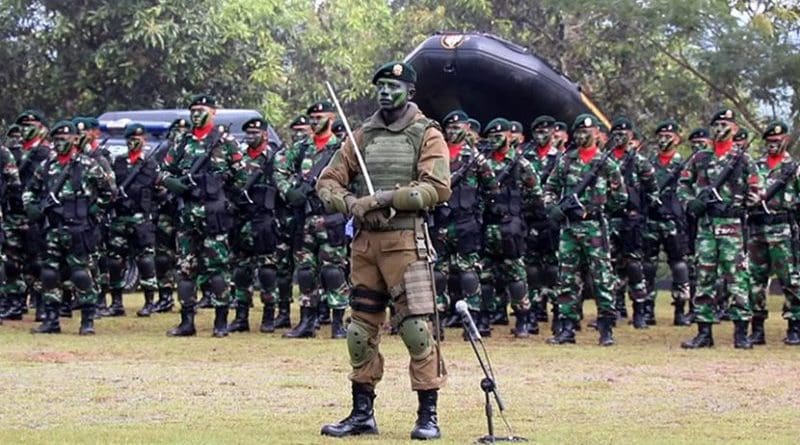Indonesia’s Military Still Preoccupied With Internal Security – Analysis
By Adhi Priamarizki*
The separation of the Indonesian police from the military in the early 2000s was supposed to establish a line between internal security and external defence. Two decades later, the distinction between these roles is still blurred.
The Indonesian military has been involved in the Tinombala operation in the Central Sulawesi city of Poso since 2016 and increasing military operations in Papua since 2019. The Indonesian National Police and military launched the Tinombala operation — later called the Madoga Raya operation — to curb the Mujahideen Indonesia Timur (MIT) terrorist group. In Papua, the military used the insurgency and dire social unrest to justify its participation in police operations in the region.
The military’s preoccupation with internal security is not a recent phenomenon — it was crystallised in the early days of the country. The Indonesian National Revolution (1945–1949) and the bitter experience of combating secessionist movements in the 1950s and 1960s set the standard.
The military’s historical legacy and Indonesia’s evolving internal security dynamics have preserved its involvement in safeguarding domestic security. The need to overcome internal security threats more effectively has long been used to justify and prolong their involvement.
Indonesia’s New Order regime (1966–1998) prioritised economic development and saw maintaining regional security and domestic stability as key in achieving this goal. Domestic stability was propagated as a form of conserving national unity. The military’s role was epitomised in the phrase ‘defending the unity of the Republic of Indonesia at all costs’ (NKRI harga mati).
This moulded the Indonesian military into an internal security force. The post-New Order period’s defence white papers identified possible domestic disruption scenarios while downplaying the possibility of international conflict. A national focus on internal security contributed to the identity formation of the Indonesian armed forces.
In Poso, the military has been working with the national police on the Tinombala operation since 2016 and the Madoga Raya operation since January 2021 to suppress the MIT terrorist group. Before Tinombala, the police launched the Camar Maleo operation without any military involvement, but tracking MIT in its mountainous and forested hideouts became a major hurdle for the police who, unlike the military, have limited jungle capabilities.
In April 2021, Indonesia’s Coordinating Minister for Political, Law, and Security Affairs Mahfud MD changed the official label for armed separatist groups from ‘criminal groups’ to ‘separatist-terrorist groups’. The renaming could enlarge the military’s stake in internal security operations, as countering separatism and terrorism fall under the military’s ‘other than war’ mandate.
The government claims that the renaming process was carefully considered and crafted in accordance with the 2018 Anti-Terrorism Law, which allows greater military involvement in counterterrorism via the issuance of a specific presidential decree. Putting a separatist-terrorist label on Papuan groups is likely to exacerbate tensions and further destabilise the situation in the region.
The renaming raised concern particularly among civil society organisations and human rights activists over possible abuse. Yet escalations in armed attacks require an immediate and effective response from the security apparatus. CNN Indonesia has been reporting that armed separatist groups have been attacking civilians. On 25 April 2021 the Papua Regional National Intelligence Body Chief, Brigadier General I Gusti Putu Danny, was killed in an attack on Beoga district.
There may be issues that could result from the military’s involvement in internal security, particularly in countering terrorism. Institutional rivalry between the military and police in the counterterrorism field is one example. Such rivalry in the past has created friction between the two institutions, creating obstacles such as a reluctance to share intelligence data. The Indonesian government had planned to issue a presidential decree in 2020 to limit military involvement in counterterrorism operations, but this was halted due to resistance from the public.
Criticisms of military involvement seem to have mostly dissipated. The parliament has voiced agreement on the armed forces having a stronger role despite the absence of a sufficient legal and regulatory framework. The need to tackle internal security threats immediately has taken precedence over the issues that may arise from the entanglement of the military in internal security.
Under these circumstances Indonesia needs to urgently establish proper and detailed guidelines regulating the military’s involvement in home affairs. The military should be brought in as a last resort only, in a police-supporting role, and more formally limited to combating insurgencies in inaccessible areas that the police do not have the capability to reach themselves. Meanwhile, to lower the levels of unrest, the police need to focus on developing more humane strategies in their approach to enforcing order — this may well be in their own interests as it would reduce the need for the military in the first place.
*About the author: Adhi Priamarizki is a Visiting Fellow in the Indonesia Programme at the S Rajaratnam School of International Studies, Nanyang Technological University, Singapore.
Source: This article was published by East Asia Forum

